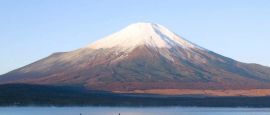Japan History, Language and Culture
History of Japan
Influence from the outside world, followed by long periods of isolation, has characterised Japan's history. In the feudal era (12th-19th century), a new ruling class of warriors emerged: the samurai.
One of the most famous and successful samurai, Oda Nobunaga, conquered numerous warlords and had almost unified Japan when he was assassinated in 1582. Toyotomi Hideyoshi succeeded him and united the land in 1590, but war broke out following his death.
Tokugawa Ieyasu defeated the rival Western Army in the Battle of Sekigahara in 1600 and was appointed shogun (military governor of Japan). The Tokugawa shogunate began the isolationist sakoku (locked country) policy that spanned the two and a half centuries of tenuous political unity known as the Edo period.
In 1854, the US Navy forced the opening of Japan to the outside world. Ensuing economic and political crises led to the Boshin War and the establishment of a centralised state unified under the name of Emperor Meiji.
The Meiji period (1868-1912) saw major economic and social changes, which in turn transforming Japan into an industrialised world power that embarked on a number of military conflicts to expand the nation's sphere of influence, including two Sino-Japanese Wars (1894-1895 and 1937-1945) and the Russo-Japanese War (1904-1905).
On 7 December 1941, Japan attacked the US naval base in Pearl Harbor, followed by a declaration of war against the allied forces. This act brought the US into WWII and, on 8 December, the Allied forces consisting of the USA, UK, Netherlands and several other countries declared war on Japan. After the devastating atomic bombings of Hiroshima and Nagasaki in 1945, Japan surrendered. The war cost Japan millions of lives and left much of the country's industry and infrastructure destroyed.
Japan later achieved exceptional growth to become one of the world's most powerful economies in the 1970s. In the early years of the 1990s, the Japanese economic bubble burst, ushering in an era known as the 'lost decade' – an economic crisis from which the country has only recovered in recent years.
The 2011 earthquake, which occurred off the coast of Japan and unleashed a devastating tsunami on the Tōhoku region, still looms large in the country's memory. It killed nearly 16,000 people and triggered equipment failures at the Fukushima Nuclear Power Plant, which resulted in the largest nuclear meltdown since the 1986 Chernobyl disaster.
Did you know?
• Napping on the job may be frowned upon in many countries, but snoozing at work is acceptable in Japan. The practice, known as inemuri, is used to demonstrate the sleeper's dedication to their work.
• Melons are big business in Japan, with the rare black Densuke watermelon, grown only on Hokkaido, selling for around ¥28,000.
• Vending machines can be found at almost every street corner in Japan. They sell everything from batteries and rice to beer.
Japan Culture
Shintoism and Buddhism are the most common religions (most Japanese follow both religions, although religion does not play a major everyday role in most Japanese lives). Marriages are traditionally conducted at Shinto shrines and funerals at Buddhist temples, as Shintoism sees death as impure.
Christians aren't common - only about one percent of Japan's population consider themselves Christians.




 You know where
You know where